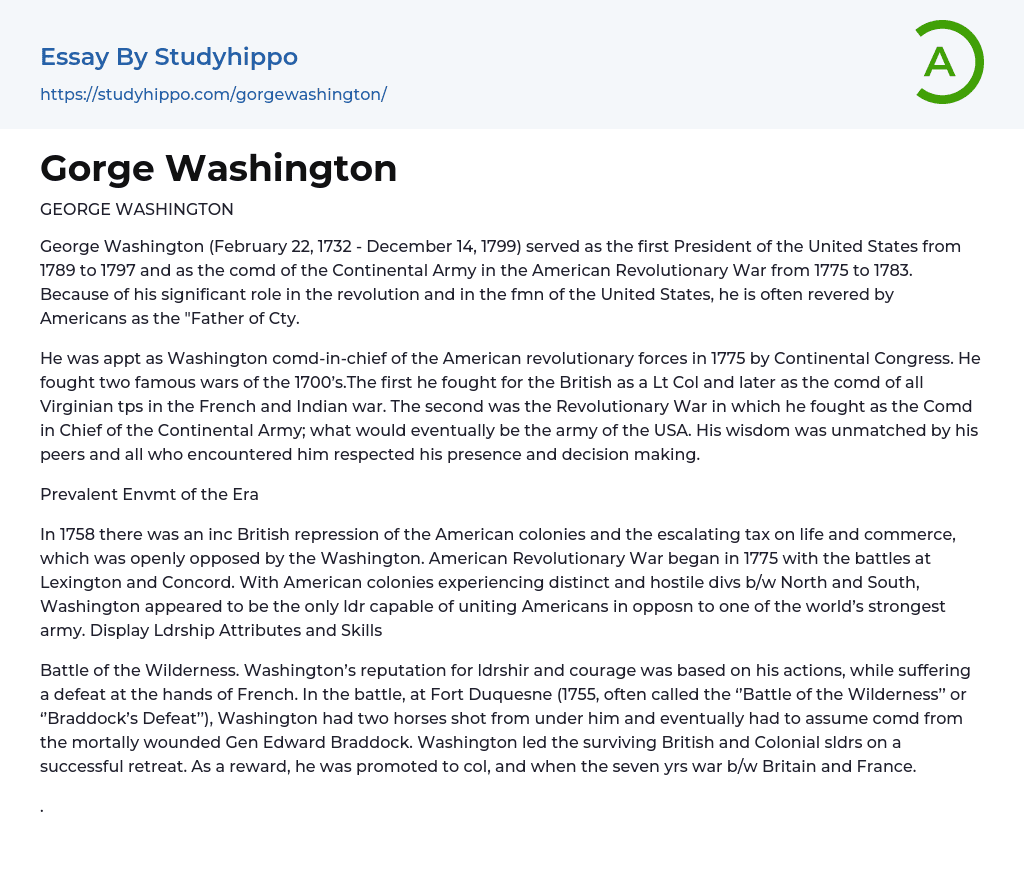GEORGE WASHINGTON
George Washington was the first President of the United States from 1789 to 1797. He also led the Continental Army during the American Revolutionary War from 1775 to 1783.
Due to his significant role in the revolution and the formation of the United States, Americans often refer to him as the "Father of Country." In 1775, he was appointed by the Continental Congress as Washington's commander-in-chief of the American revolutionary forces. He participated in two notable wars during the 1700s. Initially, he served as a Lieutenant Colonel for the British and later became commander of all Virginian troops in the French and Indian war. The second war was the Revolutionary War, where he led as Commander-in-Chief of the Continental Army, which eventually became the army of USA. His wisdom surpassed that of his peers, and everyone who encountered him respected his presence and decision
...-making.
In that era
In 1758, there was an increasing British repression on American colonies along with escalating taxes on life and commerce. Washington openly opposed these measures.
The American Revolutionary War commenced in 1775 with the occurrences of the battles at Lexington and Concord. The American colonies were divided and hostile towards each other, particularly between the North and South regions. It appeared that Washington was the sole leader capable of uniting Americans against one of the most powerful armies in the world. During the Battle of the Wilderness, Washington showcased his leadership attributes and skills. Despite experiencing a loss by the French, Washington's reputation as a courageous and skilled leader was established. This battle, also referred to as Braddock's Defeat or the Battle of the Wilderness, transpired at Fort Duquesne in 1755. In
this battle, Washington encountered two horses being shot down while assuming command from General Edward Braddock who had sustained fatal injuries. Subsequently, he successfully led remaining British and Colonial soldiers in a retreat.
As a result, he was promoted to colonel during the seven-year war between Britain and France.
- Air Force essays
- Army essays
- Soldiers essays
- Army Values essays
- United States Army essays
- Veteran essays
- Aircraft essays
- Sergeant essays
- Abolitionism essays
- Adam Smith essays
- American History essays
- American Revolution essays
- Ancient Egypt essays
- Articles Of Confederation essays
- Atlantic Slave Trade essays
- Aztec essays
- Benjamin Franklin essays
- Civil Rights Act of 1964 essays
- Civil Rights Movement essays
- Civil war essays
- Cleopatra essays
- French And Indian War essays
- Gettysburg essays
- Great Depression essays
- Hurricane Katrina essays
- Industrial Revolution essays
- Jamestown essays
- Manifest Destiny essays
- Mccarthyism essays
- Patrick Henry essays
- Pearl Harbor essays
- Pocahontas essays
- Prohibition essays
- Pyramids essays
- Salem Witch Trials essays
- Slavery essays
- The New Deal essays
- Thirteen Colonies essays
- Westward Expansion essays
- Abraham Lincoln essays
- Andrew Jackson essays
- Barack Obama essays
- Bill Clinton essays
- Donald Trump essays
- Franklin D. Roosevelt essays
- George W. Bush essays
- George Washington essays
- James Madison essays
- John F. Kennedy essays
- Lyndon B. Johnson essays




